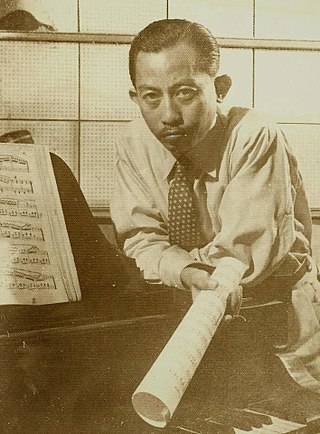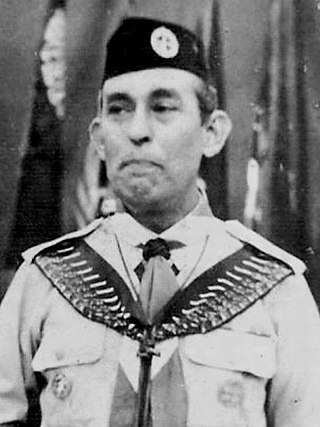Related Research Articles

Hajji Chrismansyah Rahadi, better known by his stage name Chrisye, was an Indonesian progressive pop singer and songwriter. In 2011, Rolling Stone Indonesia declared him the third-greatest Indonesian musician of all time.
Rayuan Pulau Kelapa is an Indonesian song written by Ismail Marzuki (1914-1958), who wrote a number of popular tunes in the country's early post-independence period. The lyrics praise Indonesia's natural beauty, such as its floral-related double entendres, islands and beaches, and profess undying love for the country.

Ismail Marzuki was an Indonesian composer, songwriter and musician who wrote around 202 to 240 songs between 1931 and 1958, including numerous popular patriotic songs. Among his best-known works are "Halo, Halo Bandung", "Gugur Bunga", and "Rayuan Pulau Kelapa". In 1968, he was honoured with the creation of the well-known Taman Ismail Marzuki which is a cultural centre in Menteng in central Jakarta. In 2004 he was declared one of the National Heroes of Indonesia.

Widjojo Nitisastro was an Indonesian economist, who was known as the main architect of the Indonesian economy during the New Order regime of President Suharto, serving as Minister for National Development (1971–1983) and Coordinating Minister for Economy, Finance and Industry (1973–1983). He was one of Indonesia's best-known and most respected economic policy-makers, both within Indonesia and overseas.

Ahmad Syech Albar, better known by his stage name Bing Slamet, was an Indonesian singer, songwriter, comedian, and actor. During his career, he acted in 17 films and released "dozens" of albums. Shortly before his death, he received a lifetime achievement award from the Governor of Jakarta. Three of his songs were chosen by Rolling Stone Indonesia as some of the best Indonesian songs of all time.

Toeti Heraty was an Indonesian poet. She has been singled out as the "only woman amongst the leading contemporary Indonesian poets".

Addie Muljadi Sumaatmadja or better known as Addie MS is an Indonesian conductor, producer and composer of Sundanese and Javanese descent. He currently directs the Twilite Orchestra, which he founded in 1991.
Haryo Heroe Syswanto Ns. Soerio Soebagio, better known as Sys NS, was an Indonesian radio personality and politician.
"Kebyar-Kebyar" is a 1979 patriotic song by the singer Gombloh. In 2009 it was listed by Rolling Stone Indonesia as the second best Indonesian song of all time.

Raden Nganten Nurnaningsih was an Indonesian actress. She has been described as Indonesia's first sex bomb.

Djadoeg Djajakusuma was an Indonesian film director and promoter of traditional art forms. Born to a nobleman and his wife in Temanggung, Central Java, Djajakusuma became interested in the arts at a young age, choosing to pursue a career in theatre. During the Japanese occupation from 1943 to 1945 he was a translator and actor, and in the four-year national revolution which followed he worked for the military's educational division, several news agencies, and in drama.

Terang Boelan is a 1937 film from the Dutch East Indies. Written by Saeroen, directed by Albert Balink, and starring Rd Mochtar, Roekiah and Eddie T. Effendi, Terang Boelan follows two lovers who elope after one is almost forced to marry an opium smuggler. The film was shot in the Indies and Singapore, and was partially inspired by the 1936 Hollywood film The Jungle Princess. It was aimed at native audiences and included keroncong music, which was popular at the time, and several actors from Balink's previous work Pareh (1936).

Bagindo Azizchan, was an Indonesian independence fighter and second Mayor of Padang after independence. Inaugurated on 15 August 1946, replacing Abubakar Jaar. He died at the age of 36 after being involved in a battle against Dutch forces. His body was buried at the Bahagia Heroes Cemetery, Bukittinggi. On 9 November 2005, Bagindo Azizchan was declared a National Hero of Indonesia.
Halo, Halo Bandung is an Indonesian patriotic song written by Ismail Marzuki that describes the spirit of the struggle of the people of the city of Bandung in the post-independence period in 1946, particularly in the Bandung Sea of Fire that occurred on March 23, 1946.

Koesbini was an Indonesian composer and musician. Born the son of a forest ranger in Mojokerto, he became interested in music at a young age and became a member of a Surabaya-based orchestra. By the 1930s he was composing his own kroncong songs and playing the violin and singing on radio broadcasts, gaining enough popularity to be contracted to Majestic Films in 1941 and score two films. During the Japanese occupation of the Dutch East Indies, he composed the song "Bagimu Negeri", later considered his most significant work. During the Indonesian National Revolution, Koesbini supported the republican government, and after the revolution concluded he operated his own music school while working for the Ministry of Teaching, Education, and Culture and continuing to write new songs.

Tiga Dara is a 1957 Indonesian musical drama film starring Chitra Dewi, Mieke Wijaya, and Indriati Iskak. Directed by Usmar Ismail for Perfini, the film follows three sisters who live with their father and grandmother. When the eldest sister, Nunung, shows no interest in marrying, her family tries unsuccessfully to find a husband for her. Nunung initially rejects the advances of a young man named Toto, who instead dates her younger sister. However, when he becomes jealous and travels from Jakarta to Bandung to profess his love, she agrees to marry him.

Major Muhammad Husein Mutahar was the founder of Paskibraka, a youth organization in Indonesia which has the main task for raising and lowering the heirloom national flag of Indonesia in ceremonies commemorating the independence day of Indonesia. Mutahar was also an Indonesian music composer, especially for national songs and children's songs. As a composer, he was better known as H. Mutahar as his abbreviation name. In addition, as a diplomat Mutahar was once served as Indonesian ambassador to the Vatican in 1969 to 1973.

Salmantyo "Sal" Ashrizky Priadi is an Indonesian singer-songwriter and actor. He released his debut studio album, Berhati in 2020, followed by MARKERS AND SUCH PENS FLASHDISKS in 2024. As an actor, he has starred in various films, including the Locarno-winning Vengeance Is Mine, All Others Pay Cash (2021) and Yosep Anggi Noen's 24 Hours with Gaspar (2023).
References
- ↑ Ismail 2007 , p. 174
- 1 2 3 Torchia 2007 , pp. 109–110
- ↑ Friend, Bill personal comment 22 April 2004; Friend, Theodore (1988). Blue Eyed Enemy . Princeton University Press. pp. 228 & 237. ISBN 978-0-691-05524-4.; Nyoman S. Pendit, Bali Berjuang (2nd edn Jakarta:Gunung Agung, 1979 [original edn 1954]); Reid (1973), page 58,n.25, page 119,n.7, page 120,n.17, page 148,n.25 and n.37; Pramoedya Anwar Toer, Koesalah Soebagyo Toer and Ediati Kamil Kronik Revolusi Indonesia [Jakarta: Kepustakaan Populer Gramedia, vol. I (1945); vol. II (1946) 1999; vol. III (1947); vol. IV (1948) 2003]; Ann Stoler, Capitalism and Confrontation in Sumatra's Plantation Belt, 1870–1979 (New Haven:Yale University Press, 1985), p103.; all cited in Vickers (2005), page 100
- 1 2 Muchlis & Azmy 1992 , p. 117
- 1 2 Ismail 2007 , p. 47
- ↑ "Remembering patriotic tunes in peace time". The Jakarta Post. 15 August 2010. Retrieved 11 July 2011.
- ↑ G. & Yanti 2006 , p. Table of contents
- ↑ Sidik, Jafar (31 December 2010). "Tokoh Lintas Agama Peringati Wafatnya Gus Dur" [Multiple Religious Figures Memoralize Gus Dur's Death] (in Indonesian). ANTARA. Archived from the original on 19 July 2012. Retrieved 11 July 2011.
- ↑ "Soeharto Dimakamkan di Astana Giribangun" [Suharto is Buried in Giribangun Palace] (in Indonesian). Gatra. 28 January 2008. Retrieved 11 July 2011.[ permanent dead link ]
- ↑ Suryanto (14 April 2011). "Rosihan Anwar Dimakamkan Secara Militer" [Rosihan Anwar is Given a Military Burial] (in Indonesian). ANTARA. Retrieved 11 July 2011.